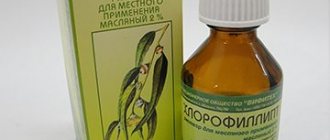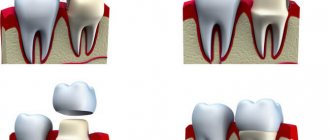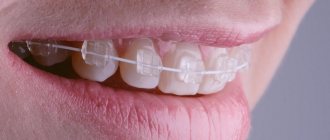Causes
There are many different reasons that can lead to the mucous membrane in the mouth beginning to peel off. Although most are considered harmless, the discomfort and pain caused as a result of this condition can be unbearable. Most often, the lining of the mouth will heal on its own, but if it doesn't, you'll need to see a dentist for effective treatment.
Reaction to toothpaste
Hypersensitivity reactions are abnormal reactions of the immune system that occur in response to exposure to harmless substances.
For example, components in toothpaste. Sometimes the mucous membrane begins to peel off after brushing your teeth. One reason for this is a mild allergic or irritant reaction to toothpaste. Most mouth rinses contain a small percentage of alcohol. It has been found that continuous use of such rinses can lead to infections such as ulcers and even oral cancer.
Listerine is the most popular alcohol mouthwash. Therefore, it should be used only as prescribed by a doctor, as it can improve gingivitis and even help heal gum disease. You must understand that this rinse is very strong and should not be used too often. Otherwise, the alcohol in it can cause a burn to the oral mucosa and lead to its detachment. To avoid this, you can dilute Listerine with water before use. The alcohol in Listerine has been found to have the following effects:
- dries out mouth and lips
- influences test results
- leads to tissue separation in the mouth
First of all, you should change the toothpaste that presumably causes your allergy. Try another one and notice if there is improvement or if the peeling persists.
If after a week the mucous membrane continues to peel even after changing toothpaste, you need to visit the dentist as soon as possible. Or you can use fluoride toothpaste to help strengthen your mouth.
Autoimmune disorder
Such serious diseases are most often accompanied by other symptoms on the skin of the body.
It often happens that detachment of the mucous membrane in the mouth occurs as a result of an autoimmune disorder. As a result of the body attacking healthy cells, ulcers form on the mucous membrane in the mouth. Examples of such autoimmune disorders are:
- Pemphigus is an unusual, sometimes fatal disease that causes blisters in the mouth.
- Bullous pemphigoid is a less dangerous disease in which the blisters are itchy, hard and dense. The skin between the blisters is red and possibly swollen.
- Dermatitis herpetiformis is a chronic inflammatory disease caused by sensitivity or allergy to gluten.
According to the American Autoimmune Disease Association, such disorders affect up to 15% of millions of people. These are chronic conditions for which there is no cure yet. However, therapy involves attempting to control and reduce severe symptoms. The following measures will help alleviate the disease:
- Balanced diet
- Regular exercise
- Enough time to rest
- Moderate amounts of vitamin supplements
- Reducing excessive sun exposure
- Drug therapy (often hormonal)
Stevens-Johnson syndrome
With Stevens-Johnson syndrome, the skin on the body also suffers greatly.
Stevens-Johnson syndrome is a rare but serious disease that affects the skin and mucous membranes. It is usually caused by an adverse reaction to certain medications. It is also possible that the syndrome is caused by an infection.
The disease begins with flu-like symptoms, accompanied by a red rash that spreads throughout the body and forms blisters. The damaged parts will eventually die and begin to peel off. You should consult a doctor as soon as possible, as this disease requires serious treatment. Therapy is mainly aimed at identifying the underlying cause, controlling symptoms and preventing future complications.
People with Stevens-Johnson syndrome often experience symptoms such as:
- General malaise
- Severe headaches
- Joint pain
- Fever
- Cough
Some time after the first symptoms appear, a rash may appear inside the mouth, which can lead to the death of tissue in the mucous membrane and cause it to peel off. The rash usually looks like a target - darker in the center and lighter on the outside. If you brush your teeth at this stage of the disease, it can cause blisters and ulcers to develop, which, when ruptured, leave painful sores. The lining of your mouth may blister, making it painful to swallow, or you may develop a more serious problem such as dehydration.
Early treatment of this condition is recommended. Otherwise, symptoms may worsen and lead to a life-threatening infection. Your doctor will refer you to the intensive care unit or burn unit for close monitoring and treatment.
Treatment will include:
- Strong analgesics to relieve pain in moist areas of the skin and mucous membranes.
- Skin moisturizing. This can be an air filter or using a liquid.
- Replacement of fluid loss. These are liquid and tablet preparations containing nutrients that help repair damaged mucous membranes in the mouth.
- A general antibiotic if an infection is detected during a blood test.
- Mouth rinses containing an anesthetic may be prescribed to numb the mouth and make swallowing easier.
Overzealous or careless brushing of teeth
If you apply a lot of force while brushing your teeth, there is a possibility that the bristles of the toothpaste will damage the mucous membrane of the mouth and lead to its peeling.
If you stop brushing for a while or are as careful as possible, the flaking may stop, but if it doesn't, you need to see your dentist as soon as possible. You should also avoid eating acidic foods as they can aggravate the situation.
Stomatitis
Herpetic stomatitis (left) and allergic contact stomatitis, which occurs as a reaction to some substance (in this case acrylic)
Stomatitis is an inflammation of the oral mucosa. This is a painful condition that is accompanied by redness, swelling and sometimes bleeding. When swelling occurs, the expansion and contraction of the mucosa causes it to peel off. Typically inflammation is the result of:
- Poor oral hygiene
- Burns from hot foods and drinks
- A medical condition that affects the entire body.
- Allergic reaction
Most often, stomatitis occurs in children. If you notice that your child has inflammation in the mouth, you need to visit a pediatrician who will examine him, determine the real cause of the inflammation and prescribe treatment in a timely manner, which will help avoid the spread of the inflammatory process to other parts of the body.
Depending on what causes canker sores, it may or may not be contagious. Herpetic stomatitis in children is considered contagious. Infection can occur through kissing or playing in close contact with each other.
Treatment of stomatitis is based on treating the underlying cause of the infection. The fundamental factor in the treatment of stomatitis is avoidance of the causative factor. You also need to do the following:
- Maintain good oral hygiene by brushing your teeth regularly
- Avoid spicy foods (especially for children)
- You should choose your toothpaste carefully to avoid an allergic reaction.
Psoriasis on the oral mucosa
Geographical language.
Its exact cause is not known, but some studies have linked it to psoriasis. Psoriasis mainly affects the trunk and limbs, but can also develop on the lining of the mouth, including the tongue, lips, and cause peeling. The Journal of Dermatological Case Reports reports that the condition most often appears as red patches and peeling on the lips and then spreads to other areas of the body.
If you find that the mucous membrane in your mouth is peeling, contact your dentist, who will conduct a qualified diagnosis and determine the actual cause of the damage. It must be determined that the lesions are due to psoriasis and not other health problems for treatment to be effective.
According to the European Journal of General Dentistry, oral psoriasis can appear as widespread lesions on the tongue, yellow or red spots, a whitish area or translucent plaques. With this form of psoriasis, sores may appear on the roof of the mouth (the top of the mouth), the inside of the cheek, or the lips. Often the disease affects the gums. Visit your dentist to avoid spreading the infection to other parts of the body.
If you notice the following symptoms, psoriasis is most likely the cause of the flaking of the mucous membrane in your mouth:
- Red spots with white borders
- Redness of the mucous membrane in the mouth
- Detachment of mucous membrane on the gums
- Mouth ulcers
Once your doctor performs a biopsy to make a definitive diagnosis, he or she will be able to prescribe treatment, which may include topical corticosteroids or oral medications to control your body's autoimmune response.
Oral cancer
Oral cancer
Oral cancer occurs when a tumor develops in the lining of your mouth, which is the tissue that covers your mouth and digestive organs. The disease can also appear on the surface of the tongue, inside the cheeks and palate, down to the throat, gums and lips.
Oral cancer occurs when cells in the lips or mouth undergo changes in their DNA. It is this mutation that allows cancer cells to grow and divide, causing healthy cells to die, which usually causes the lining in the mouth to die and begin to peel off. It mainly starts in the flat, thin cells that line the lips and the inside of the mouth.
The cause of the mutation is unknown, but doctors cite factors that may increase the risk of developing oral cancer. These include:
- Regular use of tobacco products
- Consumption of strong alcohol
- Prolonged sun exposure
- Weakened immune system
- Sexually transmitted virus - human papillomavirus (HPV)
Visit your doctor as soon as possible to determine the best treatment options. Symptoms to watch out for:
- Mouth ulcers that do not heal within a week
- Numbness and loss of taste
- White spots on the oral mucosa
- Unexplained lumps in the mouth
- Lumps on the neck
Oral leukoplakia
Leukoplakia
Leukoplakia is a condition in which areas of keratosis (induration, keratinization) appear as firmly attached white spots on the mucous membranes of the oral cavity. Oral leukoplakia is defined as "a predominantly white, persistent lesion of the oral mucosa that cannot be characterized like any other identifiable lesion"
Oral leukoplakia is usually not dangerous, but sometimes it can be a precancerous condition. If you begin to experience severe itching, you should see a doctor as soon as possible. Although most of the growths are not cancerous, some may show early signs of cancer. The cause of this type of condition is unknown, so it is advisable to visit your dentist if you experience unusual, persistent changes in your mouth.
Oral leukoplakia varies in appearance, with changes occurring mainly on the gums, the inside of the cheeks and sometimes on the tongue. Manifestations of leukoplakia generally look like this:
- White or gray spots
- Uneven, flat texture
- Some area of the mouth may be hard
- Your mouth may develop red lesions that may show precancerous changes
People with a weak immune system (due to medications and diseases, mainly HIV/AIDS) may experience another type of this condition called hairy leukoplakia. This condition causes fuzzy white patches that resemble ridges on the tongue, which can easily be mistaken for an oral rash. This may cause the mucous membrane in the mouth to peel off.
Causes of burning in the mouth
When a person consults a doctor with complaints of a burning sensation in the mouth, finding the cause of this condition is not always easy.
Medicine knows dozens of reasons for this condition, which often requires a thorough examination. Burning mouth syndrome is known to occur in both men and women. However, this problem worries women more often, especially during menopause and the postmenopausal period. The exact reasons for this are not yet fully understood, but most likely it is due to hormonal changes in women entering menopause.
Let's consider the typical causes of burning in the mouth - from oral diseases to systemic pathologies that also give such a symptom.
Oral diseases
If it bakes in the mouth, then among the pathologies the first thing to suspect is oral disease. Often a “fiery” tongue is noted with the following pathologies of the oral cavity:
- Fungal infection of the mouth . If you have a weakened immune system, there is a risk of contracting candidiasis. This disease is popularly called thrush, because of the characteristic white, cheesy coating on the tongue. In this case, the fungus also affects the inside of the cheeks, gums and palate. It is impossible not to notice the symptoms of candidiasis due to the abundance of whitish discharge on the tongue. Some types of thrush occur without a cheesy coating (for example, atrophic candidiasis), but burning mouth syndrome is present.
- Xerostomia . This is a lack of moisture in the oral cavity, in which plaque and cracks appear on the mucous membrane. In this case, xerostomia is accompanied by a burning sensation of the tongue, especially when eating sour foods.
- Glossitis . This is an inflammation of the tongue, in which a person partially or completely loses taste. Often with glossitis there is a burning sensation and pain in the mouth.
- Viral pathologies of the oral cavity . Often this is herpes, in which the mucous membrane becomes covered with characteristic blisters.
- Other oral diseases . A burning sensation also occurs with leukoplakia, aphthous stomatitis, lichen planus and other oral pathologies.
Dental diseases
Sometimes the feeling of a flame in the mouth is associated with a certain condition and dental diseases, namely:
- Tartar deposits . In this case, the root cause of the symptom is pathogenic bacteria in hard deposits, which provoke inflammatory reactions on the tongue and mucous membranes.
- Dentures . Inadequate care of dentures often causes a burning sensation in the mouth. This is due to the fact that in the absence of proper care, biofilms of bacteria or fungi form on dentures. Microorganisms then multiply in the oral cavity, contributing to the development of inflammation. In addition, a burning sensation can be caused by the prosthetic structure itself, which touches the mucous membranes, causing injury.
- Teeth grinding . Some people suffer from nighttime teeth grinding (bruxism). In this case, there is always a risk of touching the teeth and mucous membrane of the tongue.
Allergic reaction
Another common cause of burning in the mouth is allergies. For example, this is an allergic reaction to certain foods. Often, in addition to a burning sensation in the mouth, allergies also cause other symptoms - nasal congestion, rash, redness of the skin.
Sometimes allergies develop to dental products, for example, dentures, mouth guards, braces and others. This often happens when using low-quality materials that are highly allergenic.
There are several ways to understand that a burning sensation in the mouth is caused by an allergy. Avoid eating the food that causes symptoms. If you have recently had a denture or other structure installed in your mouth, then (if possible) remove it for a few days and monitor the condition.
Diseases of internal organs
A burning sensation in the mouth and tongue is sometimes caused by certain diseases of the gastrointestinal tract, endocrine, nervous and other systems. Such pathologies include:
- gastritis;
- stomach ulcer;
- duodenitis;
- colitis;
- diabetes;
- hormonal changes during menopause;
- stress and mental disorders;
- heart and vascular diseases;
- other diseases.
A burning sensation in the mouth or throat is sometimes associated with poor oral hygiene, taking certain medications, and a deficiency of certain vitamins. In particular, we are talking about a lack of folic acid, iron, vitamin C, iodine (problems with the thyroid gland arise in the background) and other biologically active substances and microelements.
The mucous membrane in the mouth peels and hurts
Sometimes the ulcers can be very painful. This is in addition to the fact that the mucous membrane begins to peel off because of them. If you experience severe pain and the detachment does not go away after a week or so, you need to see a dentist for diagnosis and prompt treatment.
Psoriasis in the mouth can have similar symptoms, which is also believed to cause a condition called geographic tongue. Psoriasis often affects the trunk and extremities, and most likely causes lesions on the mucous membranes, including the tongue, lips, and inside the mouth. According to the Journal of Dermatological Case Reports, in rare cases, the lesions may appear as red spots and areas of peeling mucous on the lips before spreading to other places on the body.
Although psoriasis in the mouth is quite rare. If you have it and are experiencing injuries in your mouth, you need to talk to your dentist to make sure your symptoms are due to psoriasis and not some other infection. A more serious cause of mucosal detachment and pain in the mouth is Stevens-Johnson syndrome, but it is usually accompanied by a number of more serious symptoms, including damage to the skin, eyes, all mucous membranes, fever, etc.
Additional symptoms to watch for before you visit your doctor include the following:
- White sores inside the mouth that won't go away
- Bumps or small pimples in the mouth
- Dryness and cracking of lips
- The mucous membrane on the gums peels off
- Ulcers
Is it possible to determine the cause of a burning sensation in the mouth based on symptoms?
The reasons why the oral cavity burns can only be determined by a doctor. Given the wide range of diseases and conditions in which such a symptom is possible, independent determination of the root cause often leads to false conclusions.
However, for some combinations of symptoms, the underlying cause can be determined with a high degree of probability. Let's consider several of these options:
- Severe burning sensation in the mouth – glossitis, stomatitis, anemia or menopause.
- Burning sensation and abundant white coating – candidiasis (thrush).
- Burning palate - viral or bacterial pathologies of the oral cavity, mental disorders, injuries or burns.
- Burning sensation with dry mouth – disruption of the salivary glands, diabetes mellitus, taking antibiotics or diuretics.
- Burning in the gums – gum pathology (gingivitis, periodontal disease).
- Burning tongue with a sour taste – gastrointestinal diseases (gastritis, gastric ulcer).
Treatment
There is no perfect medicine for treating oral mucosal sloughs. It is important to treat the underlying cause as soon as you are diagnosed. The dentist will analyze the symptoms and compare them with one of the reasons mentioned above. He will then be able to prescribe medication to treat the detachment of the mucous membrane in your mouth.
The dentist may prescribe a local anesthetic or tablets to help relieve the pain. These medications include aspirin, acetaminophen, and ibuprofen.
Usually, mucosal detachment goes away within a few days, but if it lasts longer for you, then you need to see a dentist as soon as possible. Treating the underlying cause is the key to solving the problem.
Treatment for burning sensation in the mouth
First of all, you need to find out the cause of the burning sensation in the mouth. If the problem is related to diseases and conditions of the oral cavity and teeth, then in the dental clinic the patient is given one or more of the following measures:
- Professional teeth cleaning – removal of plaque, stone, sanitation of the oral cavity.
- Treatment of dental diseases - caries, pulpitis.
- Treatment of gum diseases – gingivitis, periodontitis.
- Assessment of the condition of dentures and their effect on the oral mucosa. If necessary, prosthetic structures are replaced.
In addition to the above procedures, therapeutic measures for burning in the mouth also include taking anti-inflammatory, antibacterial or antifungal (for candidiasis) drugs. If there is a lack of vitamins and minerals, a course is prescribed to replenish the missing biologically active substances. Some patients are prescribed physical therapy.
Folk remedies
Apart from hospital treatment, there are a few simple home remedies that can help you stop the mucous membrane from peeling off and reduce pain at home. You should note that these remedies are not a full-fledged treatment, but will temporarily soothe the pain before you finally see a dentist.
Also, some foods can irritate blisters and sores caused by detachment of mucous membranes in the mouth, tongue and throat. The following remedies will help relieve pain and irritation. You can try one of them or combine several products.
Coconut oil
Coconut oil has strong anti-inflammatory and antimicrobial properties, and, in general, improves the health of the body. This is the best remedy to get rid of peptic ulcers that cause white bumps on the tongue. All you need to prepare this remedy is fresh coconut. It’s easy to find instructions on the Internet on what to do with it to obtain oil. Or you can buy edible coke oil, although this will cost more.
To apply the tool, do the following:
- Apply a small amount of coconut oil using a swab to the sores.
- Alternatively, you can put a small amount of coconut oil in your mouth and leave it for 10 minutes before spitting it out.
- Repeat this twice a day until the peeling and white bumps on the tongue disappear.
Aloe rinses
Aloe vera is considered one of the best, if not the best, calming plant of all. The gel has many anti-inflammatory, antibacterial properties, which are very important in the healing process of white bumps on the tongue and exfoliation of the mucous membrane in the mouth.
Take the gel-like aloe pulp, half a cup of water and mix gently. Apply this mixture to wounds three times a day to relieve pain and speed up the healing of ulcers.
Wax tray
For wounds that rub against teeth or are irritated by dentures, applying a small “cap” will help. This can really reduce annoying friction significantly. You must make the mouth guard as thick as possible so that it fits around the teeth and locks into place.
Do it like this;
- Melt beeswax and coconut oil and stir
- Let the mixture cool
- Gently press the piece onto the edge of your teeth to prevent friction from causing wounds.
Rubbing with honey
Honey has antibacterial and potential anti-inflammatory properties. Raw organic honey thus forms an excellent soothing layer for mouth sores and ulcers. Placing honey on the white bumps on the tongue can help relieve pain and speed up the healing process.
All you need to do is rinse your mouth with warm water and then apply a thick layer of fresh natural honey. You can do this with your fingers or a spoon. Leave the mask/compress on for about 10 minutes before rinsing off. For optimal results, do this twice daily.










